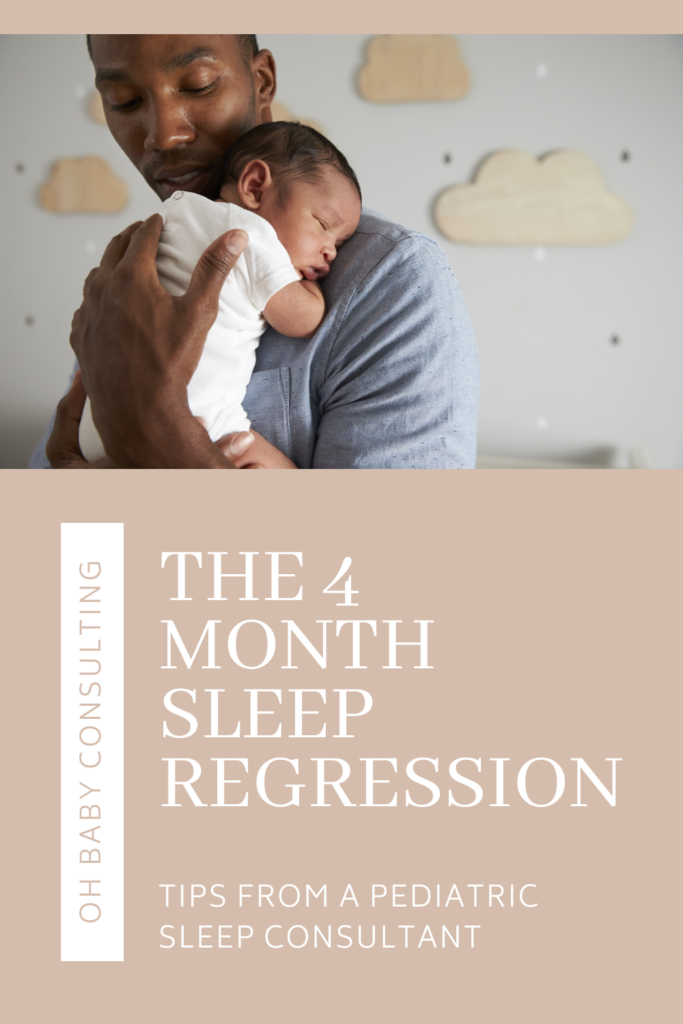I often hear parents throwing around the phrase “sleep regression” and wondering if the “X month regression” is the reason their baby isn’t sleeping through the night. Most regressions can be attributed to illness, something “new” (like a new sibling or new school), or milestone developments — whether physical, cognitive, or social-emotional — and should resolve themselves within a week or two, assuming your little one had a good sleep foundation to begin with and you stay consistent with your current sleep habits.
The four-month-sleep-regression gets a bad rap, but it is really no different from other challenges. It has the potential to negatively impact sleep, but it’s not guaranteed. There’s no ominous change that happens at the stroke of midnight the day your baby turns 4 months old. It just doesn’t work that way.
So, what is really happening, and why do some parents struggle with their baby’s sleep at this point?
Let’s break down what’s going on developmentally around this time, why you don’t have to wait until after 4 months to sleep train, and what you can do to prevent (yes, prevent) the 4-month sleep regression from becoming a nightmare.
What’s happening at 4 months?
Around four months, your baby’s sleep patterns undergo a significant shift. Their sleep cycles begin to look more like adults’, moving through lighter and deeper stages of sleep. While this development is entirely normal, it can catch parents off guard, especially if their baby was previously sleeping well.
The key difference is that your baby is now spending more time in lighter stages of sleep, making them more prone to waking up between sleep cycles. (Note: light stages of sleep are equally important parts of the sleep cycle as deeper stages of sleep. REM sleep – where the brain is consolidating information and storing memories – is one such critical light stage of sleep.) The more sensitive they are to disruptions, the more likely they are to wake up fully and struggle to settle back down without help. This can lead to more frequent night wakings, shorter naps, and an overall crankier baby.
But these sleep cycle changes aren’t the only changes your baby is going through. Around this same time, babies experience a cognitive leap, becoming more aware of their surroundings. If they rely on external sleep aids like rocking or feeding to fall asleep, they’re more likely to notice when those aids are absent and may protest when they can’t recreate those conditions on their own.
On top of these cognitive changes, many babies around four months begin hitting exciting physical milestones, like rolling over. While this is exciting as your baby becomes more mobile, it can also disrupt sleep as they adjust to this new ability. Rolling over means a totally different orientation in space for your baby and therefore can lead to surprise wake-ups or even frustration if they roll into a position they’re not yet comfortable with.
So, needless to say, there’s a lot going on.
To make matters more confusing, these changes don’t always happen exactly at 4 months either. Every baby develops at their own pace. Your baby is just as likely to undergo big developmental leaps at 3 months or even 5.5 months.
During this stage, your baby is growing – that’s a fact. And while growth spurts and developmental leaps are real, it’s not a given that they will negatively impact sleep. You might not notice any changes in your baby’s sleep, or you might see the leap affecting them in other ways, like increased fussiness, clinginess, or distractibility during feedings.
Do I have to wait to sleep train until after the 4 month sleep regression is over?
No. Full stop.
Many parents feel like they need to wait until after the 4-month mark to start sleep training, but that’s not the case. In fact, being proactive about establishing a good sleep foundation before and during this period can make a world of difference.
When you hear stories of babies who were “sleeping so well before the 4-month sleep regression and then it all went to hell,” the reality is that most of them weren’t actually sleeping that great before. They were sleeping okay, and likely with little things in place that helped, but weren’t sustainable or effective long term.
As babies get older, things like popping in the pacifier once or twice a night can escalate to needing to replace it 5-10 times. Rocking your baby to drowsy and then laying them down might no longer lead to a smooth transfer, but to a baby who pops right back up and needs you to rock them again (and again…). The little shortcuts that had previously worked well are now no longer compatible with the new sleep organization your baby has developed.
So, we know that babies might not go through “the 4-month sleep regression” exactly at 4 months. We also know that a baby’s sleep might not be impacted by the growth spurt that occurs around this time. So, why wait? I never want parents to delay getting support or making changes because they think there’s no point until some arbitrary date in the future.
Even if we had a crystal ball and could say with certainty that sleep would be negatively impacted on some exact day in the future, I would still encourage families to go through the sleep training process before this developmental leap — assuming they were ready. Because, for many if not most babies, if they have a good sleep foundation in place already — they are on a great schedule, they are sleeping independently, they are night weaned if appropriate, etc. — and then they do experience a growth spurt that impacts sleep, the chances of that being absolutely awful are dramatically reduced.
If babies are struggling with sleep because their brains are so busy, we want them to be in control of their own sleep. They’ll be less frustrated and therefore less tired because they can get themselves back to sleep more easily.
How to prevent the 4 month sleep regression
So, how can you proactively prevent this “regression” from completely disrupting your life? Here are some tips:
- Work on sleep before: Obviously, it goes without saying that you need to be ready to make sleep changes, but for most babies, if they have a good sleep foundation in place, any growth spurt or developmental change that may impact sleep will be dramatically less disruptive. And yes, it is possible to have a rough couple of days even if you have a beautifully sleep-trained baby, but every baby will benefit from having a good sleep foundation in the face of growth spurts, developmental leaps, and truly, any other curveball life throws their way. Carrying around a sleep deficit, being on an inconsistent schedule, not knowing what to expect from one night to the next — all of that makes things so much harder.
- Unswaddle: If you haven’t already transitioned from a swaddle to a sleep sack, now is the time to make that change. This is important not only for safety reasons, but developmental reasons. Giving your baby access to their hands is going to allow them the opportunity to find soothing strategies that they can use independently. Whether that’s sucking on their hands, rubbing their head, or even moving/rolling into a comfortable position, giving your baby this autonomy can help them make sleep happen more easily.
- Encourage independent sleep skills: Again, this is an intentional choice that families need to make based on how they want to approach sleep. But if sleep went from decent to rough or from bad to worse and you want to get back to your baseline (or improve upon it), it may be time to start encouraging independent sleep skills. This means helping your baby learn to fall asleep on their own, without relying on external supports like rocking, feeding, or holding. And yes, you can do this right now if you are ready! If this feels overwhelming to you, please reach out and we can get a customized plan in place for your family.
- Stay consistent: If you find yourself in the midst of difficult sleep (now or ever) it’s important to decide how you’re going to handle it and stay consistent. This is especially important if you already have an independent sleeper. Stick to your routines and sleep habits even when it feels like nothing is working. Your baby needs that predictability to help navigate these changes. As I often say to my clients, when it feels like everything is different for your baby, you need to show them that many things stay exactly the same.
Growth spurts and developmental leaps are 100% real, but they can happen at any time. And they happen continuously! Babies grow at such a rapid pace, but it’s ridiculous to think that on some arbitrary date, everything you’ve worked so hard for — especially around sleep — is suddenly going to fall apart.
If you’re dreading the so-called 4-month sleep regression, I hope this explanation has given you some context and peace of mind.
If you want to make sleep changes before, during, or after this developmental leap (or any other for that matter) ask yourself:
- Am I mentally and physically ready for this?
- Do I feel confident my baby could do this if I had the right guidance and support?
- Are we relatively healthy right now?
That’s it! You don’t need to wait for some arbitrary timeline or concept that may or may not even impact you to improve sleep.
If you’re ready to create a strong sleep foundation or need support navigating this stage, I’m here to help. Let’s work together to make sleep less stressful for you and your baby. Book a discovery call to learn more about how we can work together, or check out my on-demand sleep training course to get started right away.














